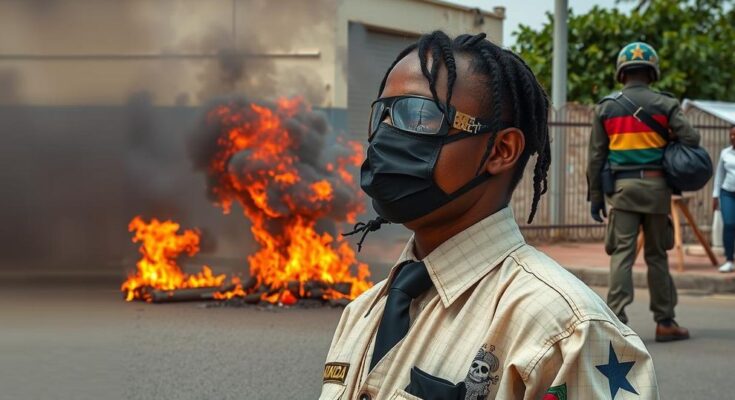Mozambique is facing severe unrest following the confirmation of Frelimo’s electoral victory, leading to violent protests and significant casualties, including at least 278 deaths since the elections. Civil unrest has intensified in the capital, Maputo, with severe disruptions to public order and the economy. Additionally, reports of mass prison escapes and ongoing allegations of electoral fraud complicate the situation further.
Mozambique is experiencing severe unrest following the reaffirmation of the Frelimo party’s victory in recent elections, extending its 50-year rule. Protesters, claiming electoral fraud and a stolen election, have ignited urban riots, particularly in the capital, Maputo. Over the past week alone, 176 fatalities have been reported, contributing to a grim total of at least 278 since the elections. The turmoil has led to widespread vandalism, with significant violence directed towards public transport and ambulances.
In a striking turn of events, Christmas Day saw the breakout of over 1,500 inmates from Maputo’s central prison, heightening the state’s instability. Although some escapees have since been recaptured, many, including a number associated with extremist organizations, remain at large. The social fabric of the nation is deteriorating as citizens express outrage over perceived government injustices and hardship, leading to rising inflation and scarcity of basic goods due to supply chain disruptions.
Efforts to restore order have been met with controversy. President Daniel Chapo’s calls for unity have been overshadowed by allegations from opposition leader Venancio Mondlane, who criticized state security for exacerbating the unrest. The pipeline of grievances against the Frelimo party is further fueled by claims of significant electoral irregularities observed by international monitors. Increasingly, foreign enterprises are not immune to protests, reinforcing the potential economic damage amid civil unrest.
In this volatile climate, Mozambique’s economy and social stability are at a crisis point, with thousands seeking refuge in neighboring countries amidst concerns for safety and security.
The recent surge in violence in Mozambique follows the official confirmation of Frelimo’s victory in the elections held on October 9. This confirmation sparked intense opposition protests claiming electoral fraud. Mozambique has a history of political tension and economic challenges, compounded by recent instability in Cabo Delgado where Islamist insurgents have been active. The current upsurge of civil unrest is critical, considering Mozambique’s socio-political landscape where dissent against the long-standing ruling party is rising.
In summary, Mozambique is engulfed in violence as post-election unrest has resulted in significant casualties and widespread social disruption. Allegations of electoral fraud and repression have led opposition supporters to protest vehemently. The unrest not only poses immediate threats to public safety but also severely impacts the economy, prompting international observers to note considerable irregularities in the electoral process and the potential for long-term repercussions if the political climate remains volatile.
Original Source: international.la-croix.com




